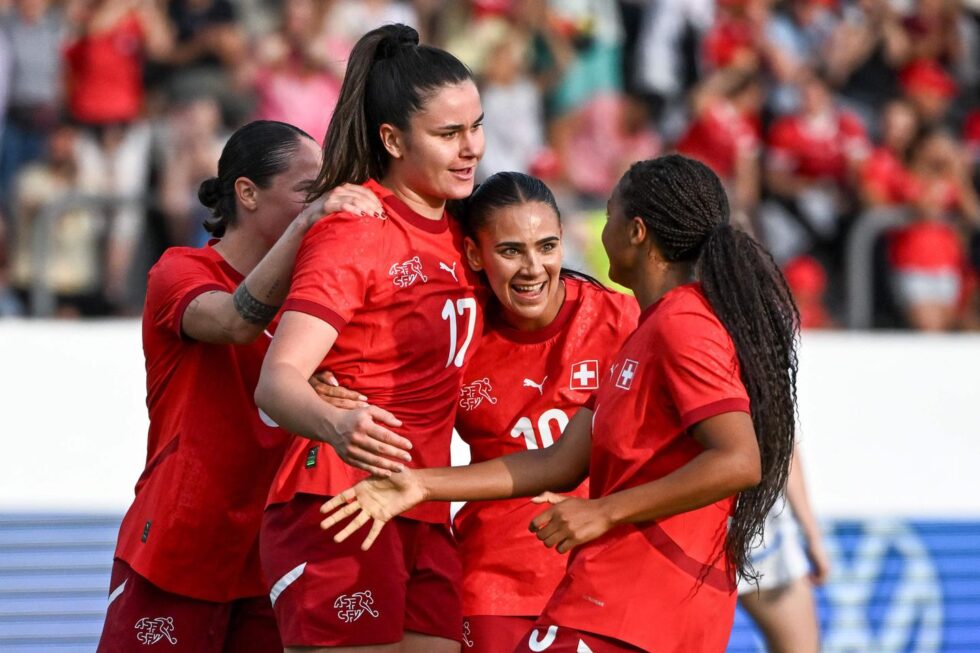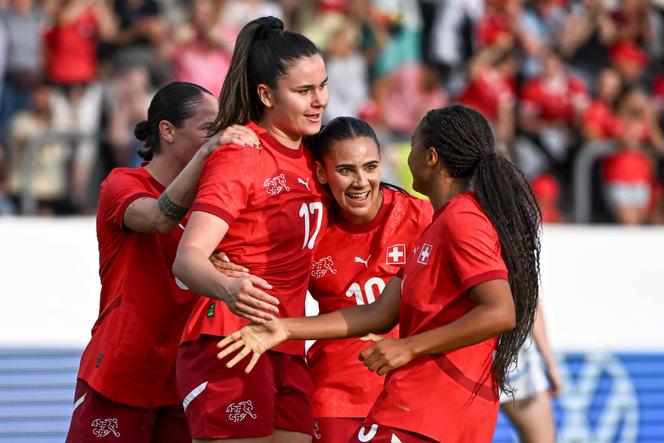

Were the mountain retreats the Swiss women’s national football team made in Thun, Magglingen or St. Gallen in recent weeks motivated by hopes of gaining some perspective? As they prepare to host the UEFA Women’s Euro football competition, from July 2 to 27, the Swiss side, which has never progressed beyond the group stage, faces high expectations.
Ahead of the tournament opening match against Norway, at Basel’s St. Jakob-Park on Wednesday, July 2, Switzerland ended a tough run of eight consecutive matches without a win, by defeating the Czech Republic 4-1 in a friendly match. The win laid the groundwork for the Swiss team to have a more reassuring start to the Euro championship, a challenge that Switzerland’s football federation, the ASF, has rigorously prepared for. The ASF’s planning got underway as soon as Switzerland was awarded the tournament in April 2023, with the federation giving itself the mission to “develop women’s football,” a phrase that Dominique Blanc, the federation’s president since 2019, had often repeated.
Almost everything about the team needed to be reviewed, and Pia Sundhage, a pioneering figure in women’s football, was given the reins to do so. Pia, a Swedish former head coach of several giant international teams, including the US from 2008 to 2012 and Brazil from 2019 to 2023, said she was “excited about the project,” as was Blanc, who viewed her appointment in January 2024 as “a new milestone for Swiss women’s football.”
‘To quickly create something phenomenal’
The Scandinavian coach, who won the Euro as a player in 1984, was tasked with helping to double the number of women involved in Swiss football by 2027, both for the ASF’s 40,000 current registered women members and the 134 women referees. “I try to draw on my experience abroad and help to quickly create something phenomenal to represent Switzerland,” Sundhage said upon her arrival. She brought a strong sense of ambition that she tried to instill in her squad, which she described as “too polite” after they were relegated to Group B of the Nations League in early June: “I want them to take their place and make their voices heard.”
The task will not be an easy one for the developing team, which currently sits in 23rd place in the FIFA rankings. Although a talented generation of young players has gradually come to reinforce the Swiss side, most of its key players still play abroad. Only five of Sundhage’s 23 picks for the season were playing in this Swiss Women’s Super League season, and two of them, 18-year-olds Iman Beney and Noemi Ivelj, were slated to play in England and Germany next year.
‘Still a big gap between the national teams’
The wave of early player departures, as is often the case in smaller European leagues, largely results from fierce competition and limited resources for clubs that struggle to fully professionalize. As a result, Switzerland’s most experienced players try to stay realistic about the ASF’s promises. Forward Meriame Terchoun, 22, who left for Dijon in 2022, told Le Monde she felt “conflicted” about the potential impact of the event: “Playing the Euro, at home, is wonderful,” she said. “But there is also the example of the 2019 World Cup in France, which was great, it was a celebration, everyone loved it. But afterwards, not much happened. I hope Switzerland will not make the same mistake.”
Switzerland would find it difficult to emulate the English model coveted by European rivals. While the Swiss federation is hosting the most lucrative UEFA Women’s Euro in history, with the prize money having been increased to €41 million, it should neither rush the process nor overestimate its place in European football. “There is still a big gap between the national teams,” said Terchoun, using the Nations League as a benchmark. “Switzerland is somewhere between League A and League B.”
The situation could soon change if the Swiss side has a successful tournament, even by surviving the group stage, as a qualification for further rounds would be unprecedented, and if the ASF continues to invest. Another promising sign is the recent emergence of several promising players, such as Barcelona’s Sydney Schertenleib, 18, and Lyon’s Leila Wandeler, 19, both recruited by Sundhage. So, too, was the sale of more than 80% of tickets before the tournament began. Finally, the sold-out tickets for the Wednesday opener against Norway, led by former Ballon d’Or Ada Hegerberg, have raised hopes of pushing the Swiss team to new heights.








